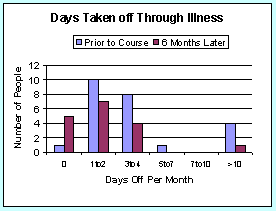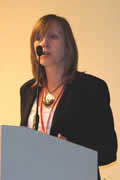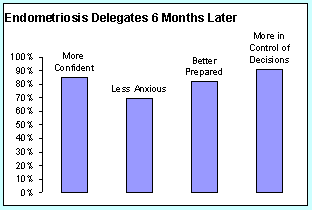WCE2005: Self-management programmes
WCE2005 Seminar on Best on Practice in Endometriosis:
Endometriosis and beyond: empowering women with endometriosis through self management programmes on how to overcome symptoms and improve physician/patient interaction
By Samantha Falconer
What is the self management programme?
Self-management (also called the Expert Patients Programme) is a rigorously researched patient led programme developed by Stanford University in the United States. In addition, Coventry University has researched self-management in the United Kingdom and their findings support the Stanford research. All National Endometriosis Society tutors are volunteers, trained under guidelines developed by Stanford University.
The underlying basis of the course is the symptom/pain cycle, showing the interaction between disease, fatigue, depression, anger/fear/frustration, stress/anxiety and tense muscles as shown in the diagram below. The aim of the course is to provide tools to break the cycle at any given point.
The course syllabus includes the following techniques, which can all be used by individuals in their day-to-day lives:
- Action planning, feedback and problem-solving
- Relaxation
- Cognitive symptom management
- Depression, anger, fear and frustration
- Better breathing, fitness and exercise
- Managing fatigue
- Healthy eating
- Communication with family and professionals
- Living wills or community resources
- Medications
- Making informed treatment decisions
What is involved with the course?
- 6 weekly sessions
- Attendees are trained by 2 tutors who have to have a chronic condition
- Self-referral onto the course, which is free of charge
- No treatment tie in
- 12 –16 participants with mixed conditions
- Free self management handbook
The National Endometriosis Society’s involvement
The National Endometriosis Society (UK) felt this programme offered a new way for women with endometriosis to be empowered, through using a range of simple yet powerful techniques, to take back the control of their lives that endometriosis can rob them of. The Society received funding from the Community Fund to train tutors (all of whom have endometriosis) under guidelines developed by Stanford University, who would then run courses for other women with endometriosis.
Evaluation
The evaluation carried out 6 months after the course gave the following results:
- 42% social life had improved
- 50% improved work/personal relationships
- 50% took fewer painkillers than before the course
- 82% quality of life improved
- 85% had a more positive attitude
- 100% would recommend the course to others
In addition, the UK health service has been running a “generic” pilot self management programme. Course evaluation carried out 4-6 months after each course, from 963 individuals over 245 courses showed:
- 6% requiring fewer outpatient visits
- 9% reporting fewer visits to GPs
- 10% more taking medicine as prescribed
- 15% making increased use of pharmacists
- 30% reporting significant reduction in feelings of depression
- 30% feeling better-prepared for consultation with care professionals
- 17% reduction in sick leave from work
Why does this technique work so well for women with endometriosis?
Endometriosis does not have a cure, it is often unpredictable in its symptoms and can be highly debilitating whilst not being recognised as a disability. Women today are often exceptionally busy, organising their lives, careers, and families. Many women face the torment of infertility. Women with endometriosis are already self-managing, they can only benefit from addition self management tools which can be implemented every day.

- The number of days taken off by women with endometriosis after attending self management courses reduced significantly.
The number of days taken off by women with endometriosis after attending self management courses reduced significantly.
The overall effect on women with endometriosis of attending the course has proved beneficial.
Statistics for endometriosis specific courses were from a sample of 33 participants, completing the questionnaire 4-6 months after the courses they attended.
Comments collected on Self Management courses for women with endometriosis include:
- “I’ve never told anyone I have endometriosis before”
- “This is the first time I’ve ever met anyone else with endometriosis”
- “I stopped feeling guilty and realised I was important”
- “With time I can manage the condition rather than it controlling me”
Self management offers benefits to the participants:
- More empowered and in control
- Focus is on ‘What can you do, not what you can’t do’
- Learn new skills to manage illness everyday
- Confidence in own abilities
- Enhanced communication skills
- Self management also offers the opportunity to become a tutor and give something back.
The course also benefits health care professionals:
- More effective interactions with patients
- Greater partnership
- Better use of GP/outpatient/pharmacy services
- Better-prepared patients
- Better patient compliance with prescribed medication and other treatment
Development of the UK Expert Patients Programme has been organic. Starting with licensed charities running the programme, it has been followed by a pilot run by the Department of Health involving 19,000 participants. This pilot is coming to an end and the programme is being handed over to local health authorities to run. Furthermore, the Secretary of State has issued the statement that: “The Expert Patients Programme will be rolled out throughout the NHS by 2008…”
The Expert Patients Programme is also licensed around the world in the following countries:
• Armenia
• Australia
• Austria
• Canada
• China
• Hong Kong
• Italy
• Japan
• The Netherlands
• New Zealand
• Norway
• Singapore
• Sweden
• Switzerland
• Taiwan
• United Kingdom
For more information on the UK programme, please visit: www.expertpatients.nhs.uk.
To find out more about licensing and which organisations already hold licenses, please visit: www.patienteducation.stanford.edu/programs/cdsites.html
Presentations
 » Best practice in endometriosis: working together!
» Best practice in endometriosis: working together!
» They hear, but are they listening?
» Implementing specialised support programmes in hospitals
» Making centres of expertise happen
» Patients and scientists: partners in breakthrough research








